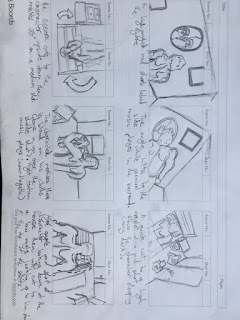Thursday, February 27, 2020
Tuesday, February 25, 2020
Props
Old oil barrels create an atmosphere of abandonment or
lack of care taken in maintaining the area, rust signifies decay formed by entropy.
Entropy links to the way the situation becomes more chaotic and dangerous as
the scene progress. 

A black hood hides the face of the victim stopping her
from seeing her surroundings and contains her along with rope. The black hood
represents uncertainty and mystery building suspense and tension as she is in a
state of panic and shock. The hood covers the identity of the wearer arguably
dehumanising them to others (especially her kidnapers) .

Rope is used to tie up the victim in order to prevent
her escape from the boot of the kidnaper’s car, this leaves the victim bound to
her hope’s situation as she cant see or move at this point in the scene. The rope
links to the vacuum being bound in the physical sense but also bound to a seemingly
dark fate.

The evil characters have torn old clothes which could
represent their lower status in society, this gives the idea that they are potentially
trying to get a ransom from the victim. The old ripped clothes are also using negative
imagery to emphasis the evil nature of the kidnappers.


The car doubles as both the kidnappers transport and
there inhuman cage used to hold their victim (in the back of the car).

Tuesday, February 18, 2020
Thriller opening
1. https://youtu.be/BnAm8NE_2Lgh?v=BnAm8NE_2Lg
This utilises fast cuts in which the tension is built up in the clip .
2. https://youtu.be/Kh0ETqutTjw
This utilises glass and the conflicting colours and meanings to express the point of the story.
3. https://youtu.be/UFnmq5PPScA
This utilises the movements with the carcter giving perspective of whats happening in the clip.


Homework week 3
Brainstorm: Mentally
ill person
- · Contrasting colours (dark when he is alone/ bright when he interacts with others).
- · Packed city living in middle to higher class old English style houses packed together.
- · The character display multiple personality disorder and bipolar disorder.
- · Mirrors act as a gate way into the characters mind.
- · Doors represent options, how the story will progress (evil or good).
- · Duality of existence.
- · Blood represents chaos and entropy. Each time the main character kills he becomes mader believing he takes on a piece of their soul (personality).
Rationale (explanation for
what you're doing and why you're making the creative decisions - DETAILS) At
least 500 words:
The scene starts with a high angled wide shot that pans down
over a bright sunny day (warm colours are emphasised), the scene contains a
large amount of thriving greenery representing life flourishing in the outside
world. The scene starts with the song Life is but a dream (non-dietetic)
playing in the background with the sound of the breeze and birds chirping (dietetic).
The main character interacts with a older woman between the ages of 40 to 55 walking
on the on the opposite side of the street in his direction, they wave and smile
at each other in a neighbourly(friendly) fashion. there is foreshadowing in
this scene as their paths will collide again but rather in a different and
darker way.
The main character walks to his front door in a perspective shot
looking on at his average identical house, this represents though on the
outside he is average and seems normal his contents like the house is anything
but normal but rather filled with hidden horrors. He opens the door where the
camera fazes from perspective to an over the shoulder as the character, he walks
down the hall into his house stairs and three doors can be seen after entry.
The colour scheme changes from the bright warm colours to dark cold colours
showing a shift in atmosphere and mood.
The main character in an over the shoulder shot stops at a
mirror at the end of the hall showing signs of frustration and anger seemingly
out of nowhere , he punches the mirror in front of him fracturing it, all the
fractures reflecting his normal face except one which seems evil and twisted. This
introduces the darker monstrous side of the character. A sudden flash to a dark
room with no doors or light sources only a hunched-up man in a black hoodie covering
his face as he sways back and forth on the floor. this room represents the subconscious
of the character.
The figure stands up still not revealing hie face to the viewer
with a mid-shot from a high angle to build up tension, he faces a mirror broken
in two revealing a normal image of the character and the other side revealing
the evil twisted version. Mirrors represent the gate to the soul in the movie.
In the subconscious room each mirror contains a version of the character. The dark
version seems to say something, but it is not audible, however dark low non-dietetic
music players in the background. The screen begins to tilt with a ear non-dietetic
music playing as the subconscious room begins to distort.
A quick cut scene has the character waking up in his dark room
with a black out of what has just happened, this part is mid shot facing the
character at eye level. Blood can be seen in the corner of the shot , it then
focuses on the blood as the character sees it .suddenly the shot cuts to a high
angle and an upside view of the character which rotates till it is level again
,this is done while he stands up looking at his clothes splattered with blood.
When the shot cuts to an upside-down view of the character non-dietetic sound
starts to build tension. The character sees more blood in the shape of his footsteps
leading down the stairs down to the basement. When the shot of the character
stands at the top of the stairs is a high angle mid shot. The character is
looking down at the house then cutting to a low angle at the bottom of the
stairs looking up at him in a wide shot of him at the top of the stairs.
Thursday, February 6, 2020
Media studies: Sherlock clip
The
Sherlock clip presents a range of moods within the clip showing the character
and how they interact with each other and situations around them. As well as creating
atmosphere which intern sets the mood for the audience to perceive how the
scene allowing them to connect with the characters. The mood changes
erratically through the clip this utilizes verisimilitude which makes the characteristics
of the characters in the clip.
Camera angle
and editing are effectively used, especially to show the intensity and state of
Sherlock. The scene starts out with multiple cut scenes slowly fading in and
out to black revealing the location while building the atmosphere through a montage
of close and wide angle shots to reveal to the viewer the intense nature of the
show down that is about to commence. The cut scenes also give the viewer an insight
to the state of the characters going into the scene through the use of snap
shots of them expressing Sherlock and Watson's fear and seriousness by utilizing
close up and extreme close up shots to focus on the details of the expression through
there features. The cut scenes speed up creating the effect of anticipation in
the viewers for what is about to happen in the scene as it progresses. The
dramatic build up then comes to a climax with an over the shoulder view from
Sherlock of him and the villain of the story putting them in direct opposition,
at the climax of the tension there is a comedic twist that is responded to by
the camera cutting quickly between the three main characters of the scene with
close ups of their faces outlining their confusion.
The
lighting in the scene utilized cold and dark colors to present the mood. The scene
is shot at night creating the mysterious atmosphere for the situation about to unfold with the use of natural
lighting .In the close up shots of the characters the use of shadows on their
faces highlight the expression of the facial features such as the signs of
Sherlock panic, Watson's dread/fear, and Moriarty's glee and anger. There is strong
use of cold colors that emanate from the light of the pool challenged by the
warm light of the lamps creating contrast how ever the cold colors take
dominance in the dark night mimicking the way the villain takes victory over
the hero of the story.
The mise-en-scene is reflected through many aspects such as the use of strong use of props
complementing the characters, amplifying the visibility of the character traits
and status they possess. Both the antagonist
and the protagonist are wearing very formal attire in the form of suits which
present them as very proper and smart, this is revealed through the stoic stand
made by Sherlock against Moriarty even though all odds were not in his favor. However,
Moriarty is presented as smart but erratic displaying multiple signs of mental
disorders such as psychopathy, sociopathy, bipolar disorder as his large
movement, voice, and temper momentarily change erratically. The use of prop
guns and bombs emphasis the hostile nature of the meeting giving the viewer a high-stake
encounter with a mentally unstable villain.
Sound is
used from a diegetic and non-diegetic perspective throughout the scene to build
and change the mood of the audience while progressing the story line along. The
scene starts to the sound of Moriarty’s voice playing over the cut scenes of
the location, setting the mood for the scene while clearly displaying his intent
towards Sherlock. Low frequency non-diegetic sound create a harrowing
atmosphere in order for the audience to feel the tension building. The build up
led to a moment of comedic relief when the use of diegetic sound through the song
staying alive started playing as Moriarty had a gun pointed at pointed at him contradicting
the likely potential outcome of the situation.
Subscribe to:
Comments (Atom)
CCR 1
Question 1 How does your product USE or Challenge conventions? In my clip, I used the convention of darkness. Darkness is used to build sus...
-
Doctor: What do i have here, the physical symptoms don't match any one virus I've seen before Doctor:Whats happening to me , i did e...
-
Technology has been rapidly evolving in every aspect of life especially in the case of films. As for this point in time there is both groups...













